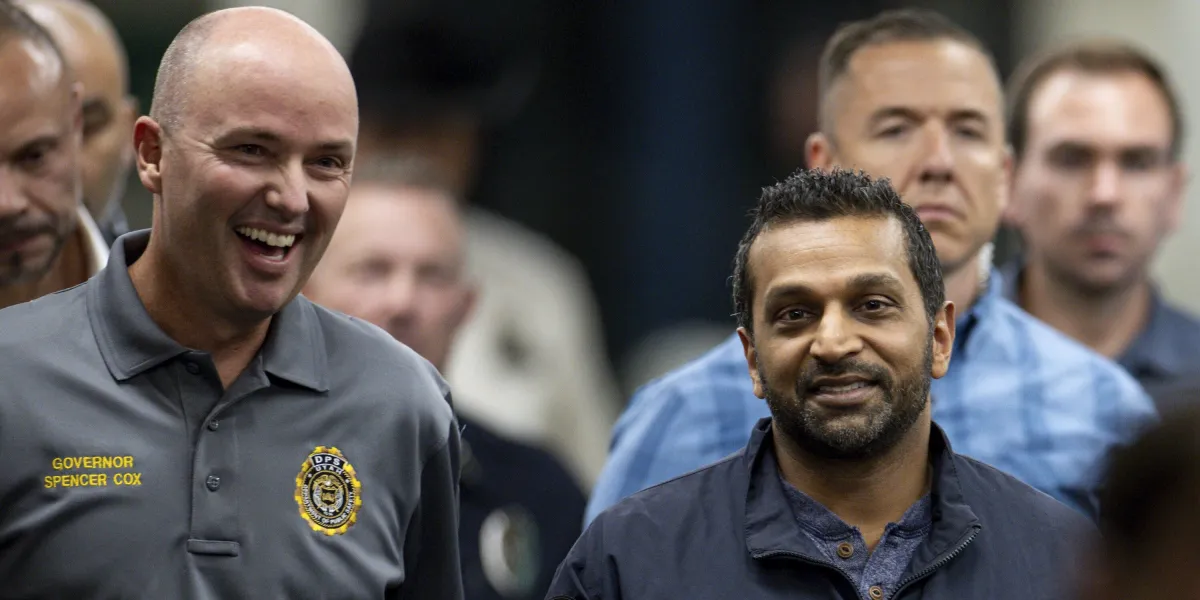
Against a drab cinderblock wall at the Utah County Jail, 22-year-old Tyler Robinson stared into the camera, a green anti-suicide vest hanging from his pale frame. The hearing, held remotely before a district court judge, was his first court appearance since being charged with the September 10 murder of right-wing influencer Charlie Kirk, who was shot dead in front of a horrified crowd at Utah Valley University. Robinson looked impassive, nodding slightly as the judge read the charges against him. At a press conference two hours earlier, Utah County prosecutors had announced they would seek the death penalty.
The imperative to execute the killer had been firmly entrenched from the start. No sooner was Kirk declared dead than conservative pundits and politicians began calling for blood, with the Utah governor issuing a swift warning to the then-unidentified gunman: “I just want to remind people that we still have the death penalty here in the state of Utah,” Gov. Spencer Cox said in a press conference within hours of the shooting. The next night, Cox confirmed he was “working with our attorneys getting everything that we need … so that we can pursue the death penalty.”
At the press conference unveiling the state’s case against Robinson, Utah County Attorney Jeff Gray insisted that the decision to seek death was one he “made independently as county attorney based solely on the available evidence and circumstances and nature of the crime.” But as with any capital prosecution, politics were unquestionably a driving force — and in Robinson’s case, the pressure came from the top. President Donald Trump, an ardent death penalty enthusiast, was blunt in expressing his desire to see Kirk’s murderer sentenced to die. “In Utah, you have the death penalty, and a good governor there, I have gotten to know him,” Trump told Fox & Friends on Friday, adding that Cox was “intent” on seeking death — “and he should be.”
Utah is far from the first state to feel such pressure to seek executions. In his executive order weaponizing the death penalty, Trump demanded that states step up their use of capital punishment, going so far as to push state attorneys general to seek new death sentences for the 37 men whose federal death sentences were commuted by Joe Biden at the end of his term.
Such political pressure has contributed to a renewed embrace of capital punishment on the right, including a dramatic spike in executions during Trump’s second term. In 2025 alone, 31 executions have been carried out across 10 U.S. states, with 12 more executions scheduled through the end of the year. Although the death penalty is still animated by state politics, MAGA-aligned governors and attorneys general have recently revived and ramped up the death penalty in states such as Indiana and Louisiana, which both recently restarted executions after a 15-year pause. In non-death penalty states like New York and Colorado, federal prosecutors have sought the death penalty in high-profile and little-known cases alike.
Cox, who has been largely silent on the death penalty during his tenure, spent years developing a reputation as a moderate Republican. He only recently refashioned himself as a Trump loyalist, surprising supporters by endorsing Trump last fall, in advance of his own reelection. Once a critic of Trump’s role in the January 6 insurrection, Cox wrote a letter to Trump following the assassination attempt in Butler, Pennsylvania. “You probably don’t like me much,” Cox wrote. “But I want you to know that I pledge my support.”
The Utah governor has also abandoned his previous image as a conservative who had distanced himself from his party’s dehumanizing rhetoric and politics targeting transgender people. In 2022, Cox vetoed a bill seeking to prevent trans athletes from participating in youth sports, writing in a lengthy statement that while he was “learning so much from our transgender community,” he was still struggling to understand the science. “When in doubt however, I always try to err on the side of kindness, mercy and compassion.” But the state legislature voted to override Cox’s decision, and the following year Cox signed a ban on gender affirming care for trans youth.
With right-wing Republicans already bent on linking mass shootings to so-called “transgender ideology,” Robinson’s alleged relationship with his roommate — who Cox described as “transitioning from male to female” — is now being treated by conservative media as a central component of the crime. Although Gray, the Utah County attorney, said he did not wish to speculate about Robinson’s motive, the theory laid out by prosecutors is largely aligned with the narrative peddled by the right: the story of a young man from a good conservative family radicalized by pro-LGBTQ+ forces, who sought to silence a warrior for free speech and traditional values. “Charlie Kirk was murdered while engaging in one of our most sacred and cherished American rights, the bedrock of our democratic republic, the free exchange of ideas and a search for truth, understanding, and a more perfect union,” Gray told reporters before announcing the charges against Robinson.
According to the state’s theory, which is based on interviews with family members and Robinson’s roommate, Robinson shot Kirk with a rifle that once belonged to his grandfather, which he wrapped in a towel and hid in a wooded area near the college campus. He later allegedly texted his roommate, “Drop what you’re doing. Look under my keyboard.” The roommate found a note reading, “I had the opportunity to take out Charlie Kirk and I’m going to take it.” Asked why he did it, Robinson wrote, “I’ve had enough of his hatred. Some hate can’t be negotiated out.”
Whether the state’s evidence against Robinson ultimately withstands scrutiny remains to be seen. Whatever Robinson’s motive, a death sentence will rely on proof beyond a reasonable doubt that he “intentionally or knowingly” killed Kirk “under circumstances that created a great risk of death to others.” Perhaps more difficult, it will also require a unanimous vote by a jury willing to take the life of a young, white man with a Mormon upbringing who is likely to remind many Utahns of their own family. The story of his parents’ decision to turn in their own son may well generate compassion among jurors who may be reluctant to further punish a family whose life has been ripped apart. And while the current outrage over Kirk’s murder makes it easy to imagine Robinson being sent to death row in a red state like Utah, the reality on the ground is more complicated.
It was not that long ago that Utah was making headlines as an unlikely leader in the death penalty abolition movement. In 2021, the Utah County attorney — Gray’s predecessor and electoral rival — announced that he would no longer seek death sentences, part of a larger turn against capital punishment among conservatives in the state. The following year, a high-profile push to abolish the state’s death penalty failed in committee by just one vote.
Among those leading the charge at the time were politicians like Utah state Sen. Dan McCay, who told local news outlets that the death penalty “sets a false expectation for society, sets a false expectation for the victims and their families, and increases the cost to the state of Utah.” Multiple studies of Utah’s death penalty system have found the price tag of Utah’s death penalty system to be shockingly high, especially when set against a life sentence.
If Kirk’s murder has not shifted the views of previously outspoken conservatives, it has certainly provided a disincentive from reminding anyone of their abolitionist stance. McCay, who did not respond to repeated messages about his position on the death penalty, has spent the past week vocally raising money to install a statue of Kirk on the UVU campus.
But behind the scenes, the cost of death penalty prosecutions has made Utah prosecutors less and less willing to seek new death sentences — a trend that is familiar across death penalty states. Juries have also proven less inclined to send defendants to death row. Indeed, Utah prosecutors have not won a new death sentence since 2008. Today, there are four people on Utah’s death row.
Conservative opposition to the death penalty has also been rooted in frustration over the decades it takes to carry out executions. Utah went 14 years without carrying out an execution until 2024, when a Native American man named Taberon Honie was executed for a murder committed in 1998. Last month, the state Supreme Court stopped the planned execution of Ralph Menzies, sent to death row for a murder that took place in 1986. Lawyers for Menzies have described their client as having “progressively worsening dementia,” which should exempt him from execution: “He’s tethered to an oxygen tank, uses a wheelchair, is confused and disoriented, and no longer understands why Utah is trying to kill him.”
For families on both sides of such cases, a death sentence only serves to drag out a traumatic ordeal. In Menzies’s case, the son of the victim compared it to a miserable “merry-go-round,” telling the press last year that he was getting close to giving up. If the judge in the case were to decide Menzies is not competent to be executed, he said at the time, “We’re done, game over. I don’t have any more fight in me.” Other victims’ family members have turned against the death penalty completely. Sharon Wright-Weeks, whose sister and niece were murdered in 1984, became one of the most vocal supporters of Utah’s previous abolition efforts, calling capital punishment “a counterfeit promise.”
For relatives of the condemned, like Randy Gardner, an anti-death penalty activist whose brother was executed by a Utah firing squad in 2010, Kirk’s assassination is a devastating setback to years of progress against capital punishment, which had already been rolled back by conservatives “blinded by Trump and MAGA,” as he wrote in a text message. But Kirk’s killing, Gardner said, has “opened up a Pandora’s box.”
This is not just true in Utah. On the same day that prosecutors announced the death penalty against Robinson, lawmakers introduced legislation to expand the death penalty in Ohio, a state that has not executed anyone since 2018. The bill would make politically motivated killings punishable by death. “We must honor Charlie’s memory not with silence, but with action,” said one of the sponsors, Republican state Rep. Josh Williams, who also happens to be running for Congress.
Politicians in other states will undoubtedly follow suit. Meanwhile, Robinson faces a long road to trial, let alone execution. With so much heated rhetoric and publicity surrounding the assassination — including incendiary statements by the governor, FBI director, and president himself — the case may well become bogged down by defense challenges arguing, with good reason, that Robinson’s right to a fair trial has been violated again and again.
As the most visceral reactions to Kirk’s murder subside, the reality of the death penalty will emerge sooner or later. In Utah, it may simply be a matter of time before conservatives are forced to remember why they began turning against capital punishment in the first place.



